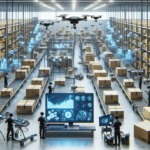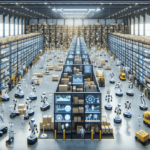The Future of Logistics: Exploring the Evolving Landscape
The logistics industry is rapidly transforming due to technological advancements, the surge of e-commerce, and heightened environmental concerns. This article delves into the key trends and innovations shaping the future of logistics, providing insights into how these changes will impact the industry.
Technological Innovations Driving Logistics Forward
Internet of Things (IoT) and Smart Warehousing
The Internet of Things (IoT) has revolutionized logistics by enabling the creation of smart warehouses. These facilities utilize sensors, RFID tags, and automation to enhance warehouse management and inventory tracking. According to a McKinsey report, IoT integration can lead to a 20-25% increase in operational efficiency.
Artificial Intelligence and Machine Learning
Artificial Intelligence (AI) and machine learning empower logistics companies to analyze vast amounts of data, identifying opportunities for optimization and cost savings. These technologies facilitate predictive maintenance, demand forecasting, and route optimization, which are critical for enhancing supply chain resilience.
Blockchain for Enhanced Transparency
Blockchain technology offers a secure and transparent method for tracking goods and transactions throughout the supply chain. It minimizes fraud, reduces errors, and enhances traceability. The IBM Blockchain platform illustrates how blockchain can streamline logistics operations by providing immutable records of transactions.
Automation: Streamlining Operations and Enhancing Safety
Warehouse Automation Technologies
Automation technologies such as automated storage and retrieval systems (AS/RS) and automated guided vehicles (AGVs) are significantly reducing labor costs and increasing efficiency. These systems handle repetitive tasks, allowing human workers to focus on more complex activities.
Autonomous Vehicles and Drones
The development and testing of autonomous vehicles and drones are set to transform transportation and last-mile delivery. According to a study by PwC, autonomous delivery vehicles could reduce logistics costs by up to 30% within the next decade.
Enhancing Safety through Automation
Automation not only boosts efficiency but also enhances safety by minimizing human error. Automated systems reduce the risk of workplace accidents, ensuring compliance with safety regulations and lowering the likelihood of costly fines or legal issues.
E-commerce and the Evolution of Logistics
Meeting the Demand for Fast Delivery
The exponential growth of e-commerce has heightened consumer expectations for fast, reliable delivery. Logistics companies are adopting same-day and on-demand delivery models to meet these demands. A Statista report projects global e-commerce sales to reach $6.54 trillion by 2023, underscoring the need for efficient logistics solutions.
Sustainable Delivery Solutions
As consumer awareness of environmental issues grows, there is increasing demand for sustainable delivery options. Logistics companies are exploring alternatives such as electric and hybrid vehicles and implementing green packaging solutions to reduce their carbon footprint.
Cross-Border E-commerce Logistics
The rise of cross-border e-commerce necessitates navigating complex international regulations and customs procedures. Partnerships with global carriers and the adoption of technologies that streamline cross-border shipping are essential for addressing these challenges.
Environmental Sustainability in Logistics
Adopting Eco-Friendly Practices
Logistics companies are under pressure to adopt environmentally-friendly practices, including using fuel-efficient vehicles, minimizing packaging waste, and optimizing delivery routes. These practices not only reduce emissions but also lead to long-term cost savings. According to the Energy Star, optimizing delivery routes can decrease fuel consumption by up to 10%.
Collaboration for Sustainability
Collaboration between companies is crucial for advancing sustainability in logistics. Sharing resources and infrastructure, such as warehouses and transportation networks, can significantly lower the overall environmental impact. Joint initiatives can also drive innovation in developing more sustainable logistics solutions.
Last-Mile Delivery: The Final Frontier
Innovative Delivery Models
Last-mile delivery is often the most expensive and complex aspect of the supply chain. Innovative models like crowdsourced and on-demand delivery, along with technologies such as drones and robots, are being deployed to enhance efficiency and reduce costs.
Enhancing Customer Experience
Efficient last-mile delivery is crucial for meeting the rising expectations of online shoppers. Providing options like real-time tracking and flexible delivery windows improves customer satisfaction and loyalty.
Digital Transformation and Data Analytics
Leveraging Big Data for Optimization
Digital transformation in logistics involves utilizing data analytics to optimize operations. By analyzing data from various sources, companies can identify inefficiencies, predict demand, and make informed strategic decisions.
Blockchain for Supply Chain Security
Implementing blockchain technology enhances supply chain security by ensuring data integrity and reducing the risk of fraud. This technology provides a decentralized ledger that offers transparency and accountability throughout the supply chain.
Addressing Data Privacy and Security
With increased digitization comes the challenge of safeguarding sensitive information. Logistics companies must implement robust data protection measures to comply with regulations like GDPR and protect against cyber threats.
Global Logistics: Navigating International Challenges
Overcoming Trade Barriers
International trade barriers such as tariffs and customs regulations present significant challenges for global logistics. Companies are investing in technology and automation to streamline processes and ensure compliance with diverse regulatory environments.
Sustainable Global Practices
Global logistics companies are adopting sustainable practices to meet the growing demand for eco-friendly solutions. This includes utilizing alternative transportation methods and sustainable packaging materials to minimize environmental impact.
Emerging Transportation Technologies
Drones and Autonomous Vehicles
Innovations in transportation, including drones and autonomous vehicles, are set to revolutionize logistics. These technologies offer significant cost reductions and efficiency improvements but also raise concerns about safety and job displacement.
Future Prospects and Challenges
While the potential benefits of drones and autonomous vehicles are substantial, addressing safety concerns and managing the transition for the workforce are critical for their successful integration into the logistics industry.
Addressing the Talent Gap in Logistics
Attracting and Developing Talent
The logistics industry faces a significant skills gap, with a shortage of workers skilled in the latest technologies and operational strategies. Companies are investing in training programs and partnerships with educational institutions to cultivate the necessary talent.
Leveraging Technology for Workforce Efficiency
Technology solutions such as automation and AI are being utilized to enhance workforce efficiency, reducing the reliance on manual labor and allowing employees to focus on more strategic tasks.
Collaboration and Partnerships for Success
Strategic Alliances
Forming strategic partnerships is essential for optimizing supply chain operations and achieving greater efficiency. Collaboration between logistics providers, shippers, and other stakeholders facilitates the sharing of resources and best practices.
Innovative Collaboration Models
Innovative collaboration models, including joint ventures and technology-sharing agreements, enable companies to leverage each other’s strengths and drive innovation within the logistics sector.
In conclusion, the logistics industry is poised for significant evolution driven by technological advancements, changing consumer expectations, and a focus on sustainability. Companies that embrace these trends, invest in innovation, and foster collaborative partnerships will be well-equipped to thrive in the future of logistics.



















